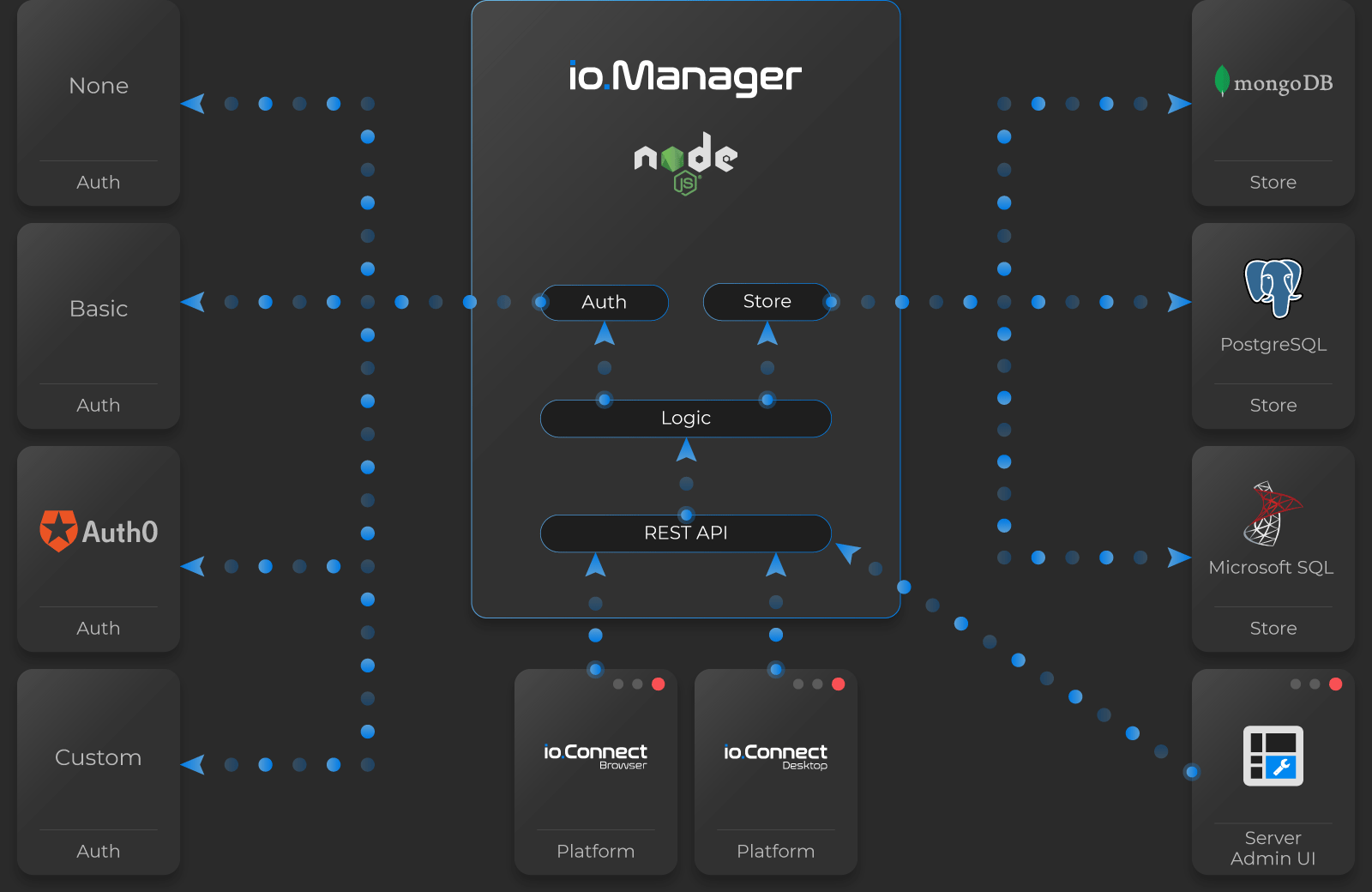io.Manager
Overview
io.Connect Desktop projects can connect to io.Manager and use its functionalities.
io.Manager is a server-side app that provides data to io.Connect (apps, Layouts, preferences) and allows monitoring and interacting with users running io.Connect.
It also includes an Admin UI that facilitates managing the data stored in io.Manager.

ℹ️ For more details about io.Manager, see the io.Manager documentation.
Configuration
To configure io.Connect Desktop to connect to io.Manager, use the "server" top-level key in the system.json system configuration file of io.Connect Desktop. Add the following basic configuration to enable connection to io.Manager:
{
"server": {
"enabled": true,
"url": "http://localhost:4356/api"
}
}This will add io.Manager as an additional app store and instruct it to store Layouts and app preferences. If you want io.Manager to be the only app store, set the "appStores" top-level key in the system.json file to an empty array.
The "server" object has the following properties:
| Property | Type | Description |
|---|---|---|
"cache" |
object |
Settings for persisting data received from io.Manager. Defaults to {}. Available since io.Connect Desktop 9.4. |
"clientAuth" |
"no-auth" | "negotiate" | "kerberos" |
The client authentication mechanism for the REST service. Defaults to "no-auth". |
"enabled" |
boolean |
If true, will enable connecting to io.Manager. |
"features" |
object |
Features to be injected automatically in io.Connect Desktop. |
"fetchInterval" |
number |
Interval in seconds at which the server will be polled for new data (apps, Layouts, commands). Defaults to 30. |
"requests" |
object |
Settings for the requests sent to io.Manager. Defaults to {}. Available since io.Connect Desktop 9.4. |
"startRetries" |
number |
Number of times io.Connect Desktop will try to reconnect to io.Manager. Defaults to 10. |
"startRetryInterval" |
number |
Interval in seconds at which io.Connect Desktop will try to connect to io.Manager. Defaults to 10. |
"tokenRefreshInterval" |
number |
Interval in seconds at which io.Connect Desktop will try to refresh the io.Manager token. Defaults to 3600. |
"url" |
string |
Required. URL pointing to io.Manager. |
The "features" object has the following properties:
| Property | Type | Description |
|---|---|---|
"applicationsStore" |
boolean |
If true (default), the io.Manager app store will be automatically injected. |
"layoutsStore" |
boolean |
If true (default), the io.Manager Layout store will be automatically injected. |
"commands" |
boolean |
If true (default), the io.Manager commands will be automatically injected. |
"preferencesStore" |
boolean |
If true (default), the io.Manager app preferences store will be automatically injected. |
To send client crashes to the io.Manager Server, use the "output" property of the "crashReporter" top-level key in the system.json file:
{
"crashReporter": {
"output": {
"type": "server",
"serverUrl": "http://localhost:4356/api/crashes"
}
}
}If you want to support different environments and regions that connect to different io.Manager instances, see the Getting Started > How to > Rebrand io.Connect Desktop > Functionality > Environments & Regions section.
Available since io.Connect Desktop 9.4
The "cache" object has the following properties:
| Property | Type | Description |
|---|---|---|
"clearOld" |
boolean |
If true, on opening a new session to io.Manager, all cache files from previous sessions will be deleted. Defaults to false. |
"enabled" |
boolean |
If true, will enable caching and persisting data from io.Manager locally (e.g., in case of connection interruptions). Defaults to false. |
"location" |
string |
Location for the persisted cache files. Defaults to "%IO_CD_USER_DATA_DIR%/ioManagerCache". |
The "requests" object has the following properties:
| Property | Type | Description |
|---|---|---|
"closeSessionTimeout" |
number |
Interval in milliseconds to wait for a response to the closeSession request to io.Manager. Defaults to 10000. |
"loggerLevel" |
string |
Log level with which the requests to io.Manager will be logged. Defaults to "trace". |
"logHTTPHeaders" |
boolean |
If true, will log the request and response HTTP headers of the requests sent to io.Manager. Defaults to false. |
"logSanitization" |
boolean |
If true (default), the logged requests will be sanitized. If set to false, sensitive information (tokens) won't be removed from the logged requests. |
"openSessionTimeout" |
number |
Interval in milliseconds to wait for a response to the openSession request to io.Manager before proceeding from cache. Defaults to 60000. |
"requestBodyValidation" |
boolean |
If true (default), the bodies of the requests sent to io.Manager will be validated. |
"responseBodyValidation" |
boolean |
If true (default), the response bodies received from io.Manager will be validated. |
"timeout" |
number |
Interval in milliseconds to wait for a response from io.Manager. Defaults to 60000. |
